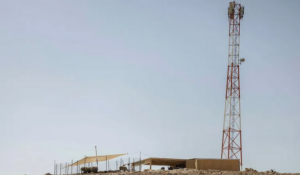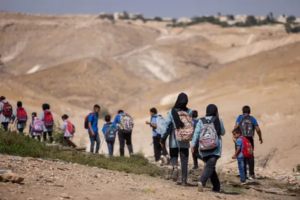New settler outpost near West Bank village of Khan al-Ahmar threatens Palestinian residents

The new Israeli outpost established near the West Bank’s Khan Al Ahmar, October 2024
Hagar Shezaf reports in Haaretz on 23 October 2024:
Residents of an outpost established two months ago near the Palestinian village of Khan al-Ahmar in the West Bank are threatening villagers and preventing children from going to school via the path that passes near the outpost.
The village used to be the target of an extensive campaign by right-wing politicians and settlers calling for its eviction, and its residents see the new outpost as a new way to try to achieve this goal.
In response to an inquiry by Haaretz, the Civil Administration said that when the outpost was established, officers went and toured it ahead of its removal, but no authorization to do so has come from the government. The government officials responsible for evicting outposts are Finance Minister Bezalel Smotrich and Settlements Administration Director Yehuda Eliyahu. The two co-founded an NGO called Regavim, which led the struggle to evict Khan al-Ahmar.
For many years, settlers, including those from the neighboring Kfar Adumim, have petitioned for the village’s removal with the support of top politicians. Additionally, in 2018, a court ruled against the residents of Khan al-Ahmar, who had petitioned against the state’s intent to evacuate them. The ruling, which was based on the illegality of the structures of the village, paved the way to its evacuation.
Conversely, the village is supported by the international community, which has pressured Israel not to evacuate it. The pressure succeeded, and, after a series of petitions, in May 2023, Israel’s High Court dismissed a petition by Regavim. The judges accepted the state’s argument that the village could not be removed at that time, citing “up to date security and foreign affairs concerns by the state.”
The new outpost, situated on a hilltop, is only a few dozen meters away from the village’s homes. A visit reveals there’s a sheep pen and two buildings. The villagers of Khan al-Ahmar say that the outpost’s settlers drive through the village, shine flashlights into homes at night and prevent children from taking their usual route to school.

Students walking to school in Khan Al Ahmar
According to one resident of the village, settlers even threatened him, telling him he wasn’t allowed to build on the site of his home. “Every time, a different settler comes here,” says village resident Eid Jahlin. “A week ago, someone from the Civil Administration came here and said that he wanted to help us. I told him, ‘You let this settler live here, and then you come here and tell me that you want to help me’?”
The school doesn’t only serve the children of Khan al-Ahmar, but children from additional communities in the area. “When we go to school, [an outpost settler] sometimes throws stones towards us and tell us to go around,” said Luay, 14, from the nearby community of Al-Mahtoush. Children from this community walk by foot to the Khan al-Ahmar school every morning.
Before the outpost was established, the students usually walked from their village to the school using a path that goes through the hill where the outpost is located. “In ordinary times, it would take us 15 minutes, but it now takes us half an hour,” said another student. “He stands there, photographing us.” The villagers said that they called the police following the incidents, but they did not help.
A village resident, who lives in a house closer to the outpost than other villagers, said that he and his family have stopped sleeping there, because of the harassment. “[The settler] comes and says that he’s responsible for security, and I am forbidden to build here,” he said.
“What’s happening here is what happened in the northern Jordan Valley,” he added, referring to the growing trend of expelling Palestinian villagers from Area C during the war, by settlers who built outposts near Bedouin communities. According to data from B’tselem, since the outbreak of the war through August 2024, 19 Palestinian communities have been expelled in this way.
In the past, top right-wing politicians, including Prime Minister Benjamin Netanyahu, supported the evacuation of Khan al-Ahmar, telling their voters that the village would be removed. The village turned into a symbol for the settler right, as well as for Palestinians and the international community.
As part of the eviction petitions, Israel gave the Palestinians in Khan al-Ahmar two alternative sites as options to move to. One is near a landfill near the city of Abu Dis, and the other is near a sewage treatment plant close to Nebi Mussa. Both options were rejected.
Eid Jahlin says that a Civil Administration representative recently visited the village, once again asking him why they wouldn’t go to Abu Dis. “I told him that that was private land,” he said. “The second alternative they gave was next to the Nebi Mussa intersection, where when you pass by you close the window because of the stench. It’s 300 meters from the sewer. I told him, if you want, you go live there. I’m willing to live there on the condition that you’ll be my neighbor.”
The Coordinator of Government Activities in the Territories stated, “The IDF, which includes the Civil Administration, is responsible, among other things, for enforcing illegal construction in Area C. The enforcement unit and unit officers enforce the law. Enforcement is carried out on the basis of an operational situation assessment and with government approval, in particular, the Settlement Authority.”
“The outpost in question was established about two months ago, near a group of illegal buildings in Khan al-Ahmar. When it was established, Civil Administration officers from the Jerusalem Region Coordination and Liaison Office went there and carried out a preliminary patrol for removing the buildings at the site. The site will be removed when government approval is obtained,” the statement continued.
This article is reproduced in its entirety
